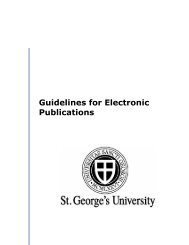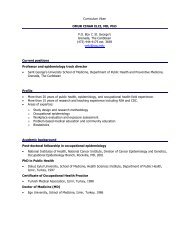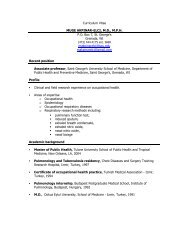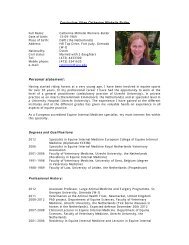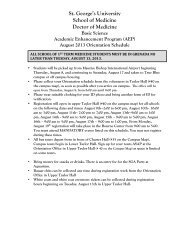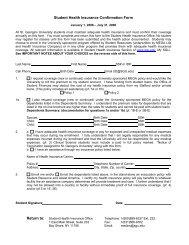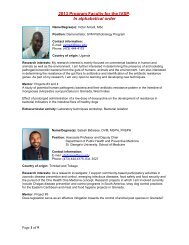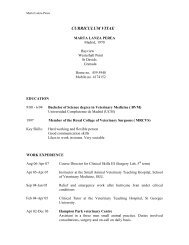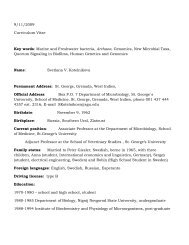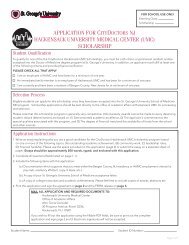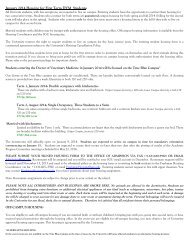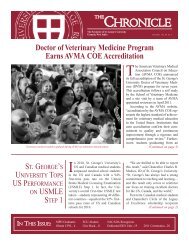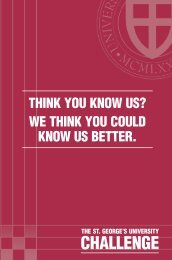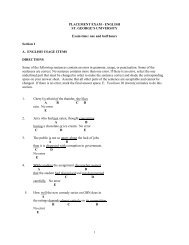SCHOOL OF 2012-2013 - St. George's University
SCHOOL OF 2012-2013 - St. George's University
SCHOOL OF 2012-2013 - St. George's University
You also want an ePaper? Increase the reach of your titles
YUMPU automatically turns print PDFs into web optimized ePapers that Google loves.
School of Medicine<br />
Course Descriptions<br />
diagnosis and genetic screening. The course concludes with<br />
introductions to growth points in modern genetics, cancer<br />
genetics, gene therapy, and the Human Genome Project.<br />
Bioethics<br />
Cheryl Macpherson, PhD, Chair<br />
SGU’s Department of Bioethics is charged with centralizing<br />
and strengthening training in ethical and professional<br />
thought and action. This department offers programs and<br />
courses to stimulate critical thinking and ethical discourse<br />
across disciplines, facilitate academic exchange, and<br />
contribute to professional development of students, faculty,<br />
visiting scholars, and Caribbean health professionals. The<br />
department serves the wider Caribbean community by<br />
providing a home for the Secretariat of the Bioethics Society<br />
of the English-speaking Caribbean (BSEC). It contributes to<br />
the White Coat Ceremony and is the base for SGUSOM’s<br />
Chapter of the Gold Humanism Honor Society (GHHS). It<br />
serves and supports SGU’s IRB and runs an active Bioethics<br />
Grand Rounds seminar series.<br />
BIOE 501<br />
Bioethics and the Professional: Medicine in Society I<br />
This course aims to strengthen students’ ability to<br />
recognize and critically analyze ethical concerns in<br />
medical situations. It provides opportunities to develop<br />
professional competencies and skills. <strong>St</strong>udents will begin to<br />
access credible information (medical informatics), formulate<br />
and express reasoned opinions, manage uncertainty, and<br />
communicate collegialy.<br />
Bioethics is a discipline grounded in the reasoning and<br />
objectivity necessary to beneficial health outcomes and<br />
patient satisfaction. It provides structure and tools with<br />
which to address the numerous moral conflicts in medicine.<br />
Bioethical concepts and terminology introduced in the<br />
course center on professionalism, principles, and theories,<br />
which are applied to vignettes and current dilemmas facing<br />
medicine today. Interactive participation occurs through<br />
group discussions, online activities, and during lectures.<br />
The course encourages students to monitor their own<br />
professional development. It is anticipated that passing this<br />
course will motivate and enable students to reflect on their<br />
own professional competencies and duties as these evolve<br />
during different stages of their medical education.<br />
Clinical Skills<br />
Winston Mitchell, MBBS, FACS, Chair<br />
CLSK 653<br />
Communication Skills and Physical Diagnosis<br />
This course instructs students in communication skills that<br />
they will need as medical students and physicians in order<br />
to relate to senior physicians, colleagues, patients and their<br />
families, and other health care professionals. The course<br />
prepares students for their role in addressing the common<br />
problems found in delivering health care, for example,<br />
providing health care instruction and delivering “bad news.”<br />
<strong>St</strong>udents will develop both oral and written communication<br />
skills and learn the components of the standard history and<br />
the art of presenting cases. The physical diagnosis portion<br />
builds on the clinical skills learned in the first year of the<br />
four-year MD program. The course uses both lectures and<br />
laboratory sessions to teach physical examination skills. The<br />
laboratory groups consist of small groups of students. The<br />
techniques of physical examination are taught by videotape<br />
demonstration, live demonstration, and supervised<br />
practice on fellow students.<br />
CLSK 655<br />
Introduction to Clinical Medicine<br />
This course teaches students in small groups at the<br />
hospital or an outpatient setting, as well as on campus<br />
using volunteer patients. The overall objective of the<br />
Introduction to Clinical Medicine course is to ensure<br />
that students understand the process of taking histories,<br />
conducting physical examinations on patients, and<br />
organizing their findings into a written or oral presentation.<br />
<strong>St</strong>udents should develop sufficient interpersonal and<br />
clinical skills in this course in order to integrate rapidly into<br />
the clinical hospital setting when they start their clinical<br />
terms. This course requires students to develop clinical<br />
thought processes leading to the art and science of<br />
problem solving in clinical medicine.<br />
Microbiology<br />
David Lennon, PhD, Chair<br />
MICR 570<br />
Medical Microbiology<br />
Medical microbiology is offered as a balanced combination<br />
of formal classroom instruction, practical laboratory<br />
experience and current literature review. <strong>St</strong>udents are<br />
60 | <strong>St</strong>. George’s <strong>University</strong>



